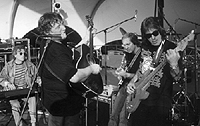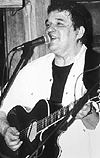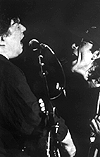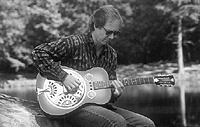
Jubilation
The Band & A Way of Life
by John Feins
This article first appeared in the National Academy of Songwriters' Musepaper, Volume 2, Issue 1, January 1999.Rick Danko and The Band were featured in the cover story of the Songwriters Musepaper, the official publication of the National Academy of Songwriters (NAS), a tax-exempt, 501(c)3 educational organization whose mission is to educate songwriters and advance the craft of songwriting. Copyright © 1999 John Feins, National Academy of Songwriters. Reprinted with permission.
Band Photos by George Lambesis.
 |
|
JIM WEIDER and RANDY CIARLANTE by John Feins Jim is a master of the Telecaster and blues and slide guitar. He was born and raised in the musical community of Woodstock during its musical Mecca peak, broadened his talents and established himself in Nashville in the early seventies, and after moving back to Woodstock in the early 1980's met Levon Helm who invited him tour with his All-Stars band. |
We seem to be in a season when culture has at last given a good listen to old time American music, thanks to the rerelease of Harry Smith's Anthology of American Folk Music, other Folkways projects, the ongoing efforts of Yazoo and Shanachie, Rounder Records' Alan Lomax project, and several book publications and television productions about this music as well as the tireless carrying of the torch by brother artists Bob Dylan, The Other Ones, The Allman Brothers, Van Morrison, Hot Tuna, and Dr. John, for example, and by elders such as Johnny Cash, Doc Watson, and Ralph Stanley. Now, thanks to The Band, we have Jubilation.
We spoke with Rick Danko at 3 p.m. E.S.T. on the tenth of November, 1998.
How about "Book Faded Brown?" That is a different kind of way for you guys to start off a record. I don't think there has ever been a Band record that started off with your vocal, and usually you guys start up tempo. This record has a quieter, more acoustic feel.
That was kinda something that just happened, you know, we weren't really planning it that way, that's just kinda the way it ended up, it seemed to be the most logical way to go at the time. I think this is the first record where I played upright bass, acoustic bass on a Band project. I've done it on other people's records and stuff, but we ended up putting the acoustic bass on about 80% of Jubilation.
Jim Geisler of Geisler Music here in Los Angeles told me earlier this year that in the Rockabilly days that kind of upright bass was called "doghouse bass," and you guys sing that in "White Cadillac, "Ain't that something, the big doghouse thumpin'.
The doghouse! Yeah. Well, it means you're still learning... that's good.
I have seen the video you did for Homespun Tapes. That helps people to understand how bass players do what they do.
I learned a lot of my bass technique from a piano player's left hand. You know, Stan Szelest. I think I pointed that out on that video tape.
Composing from the piano is very different than from the guitar.
I taught myself how to play the piano just for that reason actually. It is different to compose with a piano than a guitar.
Do you compose only on piano or guitar or do some things start off from the bass?
I've never written a song with my bass, ever. I've written music though, riffs and stuff, like stuff like "Life Is A Carnival" or "Baby, Don't You Do It," bass lines, "tarred and feathered, thistles and thorns..."
When starting out, do you think in terms of that foundational aspect of a song, particularly working with Levon all these years? Do you come at this thinking "What is the bass drum relationship gonna be in this one" or more like "What is the melody," or "I heard a cool phrase the other day and I Īm gonna do a song around this phrase?"
It's all the above and never the same way twice. Usually you use the bass to tie things together. You can tie a lot of stuff together with the bass and the rhythm section, that's what a rhythm section is for, tying it all up, although a lot of my bass playing is referred to as more melodic. Although on Jubilation this is more of a bass orientated record for me, just playing simple bass lines.
Rock & Roll does not need to get too far afield from its simpler beginnings like Buddy Holly... you guys obviously do a whole lot more than make dance music, but when I went to the show at House of Blues the thing I remember most is how much I danced.
(Laughs) That's great!
You guys have been through there two or three times since the Jericho record, each time I thought you were gonna raise the roof off the place.
 |
Artists are always having a great time there. I saw George Jones there a few weeks ago, he was having a ball. Maybe it's the room or because it is Los Angeles too. I got the sense that you guys dug being here and that you had a lot of friends here, so many of them were crowded around the stage area.
We've got a lot friends everywhere we go! That's a good room, a good, good room.
Jericho and High on The Hog have songs by Muddy Waters and Willie Dixon and a number of other cover versions. On this record there are a lot of home grown songs and songs by friends like Colin Linden and Tom Pacheco. There is a return to songwriting from within the circle of the group.
That seemed to be long overdue. We've actually been working that way lately, we're still working that way... collecting material and writing material together, and it's good.
From the standpoint of the three original members, what is like having "the new guys" bringing in material?
The chemistry seems to be working. When the chemistry works and you can feel it, grab it out of the air, that's a wonderful feeling, and it's noticeable, especially on Jubilation.
You have so very much outstanding music behind you, is there a sense of continuing a legacy to all that, or a stronger sense of having new members and being in a new phase?
You gotta understand that I don't really live for yesterday, you know, and this is a way of life. I certainly don't sit around and analyze what we've done... It's very hard for me to talk about what we do. It's more of a way of life and we do it. I don't get up every day and say "Well, I'm gonna write a song today." My life revolves around all kinds of things.
So you like the songs to happen on their own, come down from wherever they come down?
They come out of thin air sometimes, that's how the best ones happen. And then you work a little on them.
Will you work on them a lot or is there a point where you say this is not really coming together?
If it doesn't happen, it doesn't happen. If it's easy, we don't have to punch a time clock. Boy, that's life (laughs.)
You became a musician good and early, when did you first start writing songs?
I never really considered myself a songwriter, really. But I've been lucky. The few songs I have written, a lot of people have covered them, like "This Wheel's On Fire," with Bob Dylan, I think has been covered by maybe ten, eight or ten different people. A lot of The Band material has been covered, which I'm very thankful for.
Some of them are hard to adapt for solo guitar...
I go out and do solo Rick Danko shows and I tune my guitar down a full step.
For vocal reasons?
Yeah, just whatever, it's easier, things are bigger. You know when we were younger we always used to try to sing as high as possible and now we're ripe in our age.
Only so many bands can hang in there for ten, twenty, thirty years. What kinds of things happen over those stretches of time between players?
Well, you know it's a kinship, a friendship, a kinship, and a way of life. Ego, of course, can ruin so many things, we've seen that happen, with a lot of people. And it is normal. You achieve success, and then you get lonesome! That's not really a good way to live your life though. I hope we're smarter than that. Garth and Levon and myself have a kinship, a friendship. I see it spilling over with Richard Bell, Randy Ciarlante, and Jimmy Weider. And that's great that we can do that and do the other things that we want to do too, and not have any of it be an interference.
Seems that with all of you back in Woodstock and recording in Levon's barn that the playing conditions from thirty years ago that led to Big Pink are present again.
We've pretty much always tried to maintain our own studios. We've watched technology grow over the years, of course, just leaps and bounds.
So it's not that you have returned to a kind of recording process?
We've just been continuing with our lives. It seemed like there was a big hiatus where we didn't put out records. That didn't mean we weren't recording. We'd start a project and then maybe the bottom would fall out or something, the budget would fall apart or something, you know what I mean? Then all of a sudden things seemed to fall back together and, you know, here we go again.
Some of the cover songs are knock outs. "Free Your Mind" by En Vogue, a song I only happened to know from an errant night in some disco place in Santa Fe, and "Atlantic City" and stuff like that. I was surprised to see an En Vogue tune and a Springsteen tune on a Band record. How is it that songs get covered by The Band?
 |
We are going to be hearing far too much of that one next year. You didn't cover it did you?
No! The bottom fell out. That's when the bottom fell out!
The sessions you've done for the tribute records... "Deuce And a Quarter" for Scotty Moore and D.J. Fontana's All The King's Men and "Not Fade Away" and "Youngblood" (for Not Fade Away and Til The Night Is Gone.) Seemed like those were opportunities for you guys to explore music that must have meant a lot to you when you were young and getting into music.
Absolutely. Those songs meant a lot to a lot of people. "Youngblood" we were paying tribute to Doc Pomus. And of course with Bob, "When I Paint My Masterpiece." That was a lot of fun to do.
How about "Deuce And A Quarter?" What a thrill it must have been to play with Scotty and D.J.
Yeah! Scotty Moore one of my, one of all of our big time heroes. Keith Richards came by that day. Scotty Moore and D.J. Fontana... at one point they got loose enough to where they didn't mind playing some of those riffs being that they had people like us just leaning over and watching and listening... "Don't Be Cruel" and "Hound Dog," all those things.
I am intrigued by Colin Linden...
Colin is an old time friend of mine, I've known him for many, many years. I started playing with Colin, I can't count the years going back. I met him years ago of course, I was doing a blues or a folk festival out in Edmonton, Alberta... and also he opened some shows for me in Toronto, and then I played on some of his earlier records.
You and others in The Band played with him on South At Eight and North by Nine and Through The Storm, Through the Night and he has the lead song on Jericho, "Remedy."
He's one of my partners for sure.
Amazing records. A dynamite writer and a tasteful player.
A great guitar player and a great singer. And a performer as well. He's a pretty fun guy.
I hope he plays around here some time.
Oh I'm sure you'll be hearing more of him as time goes by. He's always releasing albums, man. That's what he does, it's a way of life. If he hangs in there long enough, I'm sure he'll have that one that'll click for him and make all the things that he's done come alive. I think that's the way that it works.
I have a disproportionate amount of music in my collection by other Canadians who are also great singers, and players, and writers. You must be proud of your home turf.
That and a lot of American radio stations. Our influences, you know. Before you can influence somebody you must be influenced by somebody. It's funny, people talk to me how I've been an influence to them, you know, and then I'll talk to them about some people that have influenced me, whether it be Muddy Waters, or, that first, I call them that first generation of music, Robert Johnson, Chuck Berry, Little Richard, or Hank Williams, or Hank Snow, even George Jones and Merle Haggard.
The Band was the first group to integrate all the different strains of American music and the various roots of it. There was New Orleans music, and there was of course country music, blues music, delta and urban, bluegrass music, folk music, and...
Rock and roll, Rhythm and Blues, Motown music (laughs)...
...almost no groups since have taken it all on. People say Los Lobos is similar to The Band in that regard.
 |
Those Texas guys got something special too. The Ontario area where you're from is an area where great people come from and obviously Texas too with Joe Ely, Guy Clark, Townes Van Zandt...
Yeah, Townes. God rest his soul.
Here here.
He was funny, he told me this story once. He'd showed up in Texas to play this gig and he showed up at the dance hall, as he called it. He said it was freezing there and there was nobody there and he was tired, hungover from the last night's drinking session. So he rolled himself up into a rug. Nobody could find him, you know, and I mean this sounds like it's a scene right out of a movie, but that night this rug was right on stage and he woke up and heard this chattering of people. And they were all looking for him, right, and he unrolled the rug. They all thought he staged it, of course, but he didn't. Just another day in the life of Townes Van Zandt.
Eric Anderson and Jonas Fjeld are another... have you heard that?
The first one I played a bunch. Riding The Blinds I have only heard a few times.
We're gonna make another one I think, this next year.
That must be a particularly satisfying project.
It's a lot of fun, you know, and Norway's another place where there's a lot of great musicians that people are gonna find out about, it hasn't had it's day yet, but the day is just around the corner.
Are they very influenced by American music over there?
By all of it. Yeah. Very much so.
Everybody makes much ado about how in the storm of psychedelic rock The Band just kept making their kind of good old American music. Nowadays, Rounder Records and Folkways records are putting all sorts of things out, they rereleased the Harry Smith Anthology of American Folk Music successfully, and people got an understanding of the role that played for people like Townes and Dave Von Ronk and The Grateful Dead and their learning of old American folk songs, and there's "Unplugged" and a new kind of rebirth of acoustic music. Do you find in places you go and things you do that there is better awareness from younger people of the previous generations of American players and acoustic music?
You know, I'm just thankful that I can travel this world and have a bit of a following. I appreciate the fact that I can travel the globe and have people come out and be familiar and, of course, it's the younger people who go out most. So it's the older people who've turned the younger people on to our music and, of course, I love the way that works and I'm very thankful that they even show that kind of interest. We're very aware of the turnover, the newer crowds that come into light. It's pretty incredible.
With the passing of all the blues giants, just John Lee Hooker and a couple of those guys are left, and a couple of the great country guys are still around but there will never be another Johnny Cash or another George Jones, and Bill Monroe died, Ralph Stanley is an elderly gentleman... my feeling is a lot of this great American music is not being picked up by younger players and that it is endangered as a living form. Do you think those thoughts are warranted or perhaps that's maybe too grim?
Well, I hope you're wrong. Thank God for the technology of cds and records and tapes because that's the key. Those that pick up it are those that are gonna pick up on it. I'm sure that there's always gonna be a few people passing that information along. Just like how drums in Africa were used as a telephone. Tapes and cds and records are kinda used for the same information in music.
I have always been kind of in awe that your group could have more than one and two such special vocalists. Do the vocals influence the writing, is that something that factors in when you create songs or choose songs to sing?
It's part of the equation, without a doubt. Randy Ciarlante is really coming along fine. He's a great singer. He gets better every day... He's already taking leads. I get him to share leads with me on "Spirit of The Dance," "White Cadillac." Once you see us you'll be able to see the difference. He's great.
You guys gonna take it on the road again?
Well, we're always gonna do some playing live. We're not gonna go out there and do a full fledged, hard ass tour... I play live. I'll be playing live until the day I die. But to play five nights a week... I don't want to run it into the ground.
You have not done a solo record in quite a while.
We have a new record company called Woodstock Records. I have a Rick Danko Live In Concert record out, as does Levon, Levon and The Crowmatix. I've got tapes in the archives with Richard Manuel and myself doing acoustic live shows, Paul Butterfield and myself doing live shows, Blondie Chaplin and myself doing live shows. To answer your question, every time I would start another Rick Danko solo album, I ended up doing other things... Danko Fjeld Anderson or another Band album. So I'm in no rush, I have plenty of time. Just as long as I stay happy and be as productive as I can to keep me happy, I'm more interested in that. Everything else will seek its own level.
Are you looking to do more recent projects on this new label or do you want to do archival stuff on it?
It'll seek it's own level. So far it's just cleaning up the archives and turning some people on to some things I know they'd like to hear. Just the responsibility for that is important. Who knows, one day we may be in the position to do some newer stuff. The record company that The Band is with now, River North, it's a good label. Boy, they're great, they seem to be everything that Vanguard wanted to be. Do you remember Vanguard? River North's interested in providing music, more so than making a fast dollar.
That is hard to find these days.
Very hard to find. They've never been a day late with anything that they've said they were gonna do. They're buying print ads and they've certainly been getting Jubilation out into the record stores. I feel very good about it. Levon... We got a new club in New Orleans with Levon's name. And we're gonna go down there this Christmas and New Year's. I think VH1 is gonna come down and plug in with us. Got a couple of other things in the works. Do some filming and some more recording. Maybe do an "Unplugged" or something...
What's the weather like out there today?
Well it's another beauty, real nice, but I am from New England and New York and this is the time of year when you wish you had some real fall.
Well, we got one today.
Got snow yet?
Nah, no snow, but the leaves are just about gone, and... I have a valley between me and a couple of foothill mountain ranges here. Between the Hudson Valley, I kinda look over it. I'm on one side and you can see to the other. I see about five different lines of hill ranges. But today it's a picturesque, foggy kind. I'm kind of on top of a small mountain here.
Perfect for holing up to play music in the winter.
Not bad, it helps. And you can't stand it when you go to a warmer climate, you know, just like you... I do like the air back here being real clean.
John Feins is the Director of Programs for NAS.